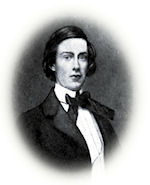London, October 25, 1861
Our American news comes much in the old way, always of a chequered character. First, we are compelled to blow away a great deal of froth on the top of the cup, and then we find the liquor more or less muddled beneath. The impression is that “some one has blundered.” Our Navy does not look as it did in the last war. Then the land expeditions indicated as much incapacity as they do now. Now our ships do nothing but catch fishing schooners. The Alliance, the Goudar, the Thomas Watson, the Bermuda, the Fingal, the Amelia, have all taken quantities of clothing, and military equipment of every description from here, of which we have had notice beforehand. But I do not see a sign of their capture in any quarter. Yet to my mind this is a greater triumph than twenty such results as that at Bull’s Run. The latter at least had the effect of seriously crippling the victor. The former supplies the material for carrying on the war indefinitely and gives to all Europe the idea of an ineffective blockade — the most dangerous thing of all to our ultimate success… I cannot sympathise with Mr. Sumner’s speech, because the tone is purely vindictive and impracticable. But I do not the less feel that we must ultimately embrace the military necessity as a basis for the reconstruction of a stable government.









